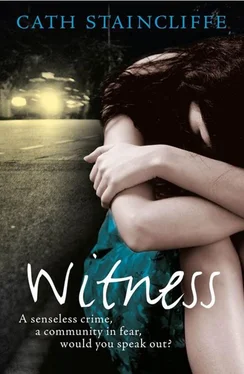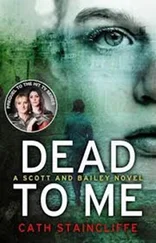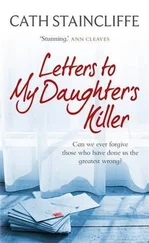Finally, as the procession followed the coffin out of the church, faces blurred with grief, ‘Abraham, Martin, John’ soared, filling the space, Marvin Gaye’s song about how the good die young. Cheryl sobbed and clung to her nana and Milo crawled between them pulling at their sleeves, disturbed by all these tears.
At the cemetery, a couple of miles south of the church, Milo was restless and Cheryl let him wander about while they lowered the coffin into the grave and Reverend James spoke again. The mourners sang at the graveside – one of the cousins had printed off hymn sheets. The day was still, muffled, but the voices sounded raw and broken. Cheryl couldn’t sing. Her chest felt too tight.
They waited until the grave was filled. Cheryl knew there were old stories from the islands of the dead trying to walk again, or of robbers taking the body, and people were still superstitious even in a different country and modern times.
Back at the church hall, Milo staggered about between legs, under the buffet tables, fractious and full of temper. Cheryl took him out and pushed him in his stroller round the car park until he fell asleep. After that, for the next two hours, even the sound of the band playing didn’t wake him.
The day wound on, the lights came on in the hall, half the guests were outside smoking. Cheryl had lost count of the people she’d spoken to, the cigarettes she’d had. Vinia had been cosying up to one of the boys from Birmingham, even though she knew he was due to be a daddy with another girl.
When they finally left, Vinia walked back with them. A starless sky. The streets looked tired in the sodium light, jaundiced. Cheryl wanted Vinia gone but Nana asked her if she’d like to stay and she said yes, double quick.
Milo never stirred when Cheryl put him in his cot. He’d got his second wind late afternoon and been on the go ever since, playing hide and seek and tig with the other kids. Cheryl looked at him lying there, his cheek sticky with sugar from some cake, his knees grubby, the curls at the nape of his neck tangled. He was perfect. Beautiful. Every time she saw him afresh she felt the glow in her heart, the big, hot, rush of love for him.
Nana was sitting in her chair, eyes closed, head resting back while Vinia made some tea. Nana looked old, the skin slack on her jaw, draped loose on her neck. Her brow and the sides of her mouth, deep furrows. When she opened her eyes to take the mug from Vinia, Cheryl saw that the whites of her eyes were yellow.
‘It’s a terrible thing.’ Nana blew on her tea.
Cheryl and Vinia murmured in agreement. Though Cheryl felt like strangling her if she said it again.
‘And no one speaks up. Someone knows.’
‘It’s not easy, Nana,’ Cheryl said.
‘I ain’t saying it’s easy but it is right. There is right and there is wrong.’
‘It was a lovely service.’ Vinia tried to head Nana off but she wasn’t for turning.
‘It wasn’t easy for Dr Martin Luther King but he speak out,’ she began the litany. ‘It wasn’t easy for Nelson Mandela but he never give in. Never.’ The skin on her face wobbled as she shook her head for emphasis. ‘Years in prison.’ She was on a roll now, jabbing her finger at them, her frown deeper, voice husky like she was wearing it out. ‘It wasn’t easy for Rosa Parks but she stood up.’
‘No, Nana, she sat down.’ Cheryl quipped. She’d been reared on the stories of these heroes, Rosa Parks refusing to go to the back of the bus, parking herself on one of the ‘white’ seats, a civil rights pioneer. Vinia laughed.
Nana snorted her displeasure, her eyes grew hard. ‘There’s talk your stepbrother might know something,’ she challenged Vinia.
Cheryl tensed, pressing her toes into the floor. Was that why Nana had asked her friend if she wanted to stay? To try and shame her into saying something?
‘That’s crazy,’ said Vinia. ‘Stupid talk.’
‘No way!’ Cheryl backed Vinia up.
Nana sipped her tea. ‘Sad day,’ she said and struggled to her feet. Cheryl didn’t know if she meant the day was sad because of the funeral, or because people were afraid to speak about the murder. ‘Goodnight and God bless,’ she told them.
‘G’night,’ Cheryl said, hands cupping her own drink, the heat hurting her fingers, studying the tremor on the surface of the tea, unable to meet Nana’s eyes.
Mike
Mike woke suddenly at five. Bolt upright in bed, slippery with sweat. He grabbed a breath, listened, wondering whether Megan had cried out, though she usually came into their room if she’d had a bad dream and wriggled between them. No one got much sleep after that, her elbows and knees sharp as tacks. Plus she snored. A four-year-old! Mike asked Vicky once if they should get her checked out. Vicky rolled her eyes and told him to forget it: they’d enough on their plates seeing doctors for Kieran, Megan was just fine.
The house was quiet. Vicky, beside him, turned over and pulled at the duvet. Mike lay back down and closed his eyes. Had he been dreaming? He didn’t usually remember his dreams. Now he sensed an aftertaste, like a blurred reflection of something wrong, something shameful. The old sour feeling from way back, times he didn’t want to think about. He wiped it away, steam on a mirror, and tried to sleep; if he got back off sharpish he’d have another two hours.
Their routine proper began at seven. Kids up and dressed. Breakfast, packed lunches. At twenty past eight Vicky did the school run. Kieran was at Brook School, a place catering for children with Autistic Spectrum Disorder. There’d never been any suggestion of him going into mainstream schools, his needs too varied, too complex. Stick him in the local primary and he’d have sat in the corner for six hours, unreachable.
The staff at Brook were fantastic. Kieran had his own programme, a combination of one-to-one and group sessions to assist with his physical, mental and social skills. He’d come on in leaps and bounds, now able to greet people he’d not met before and sometimes answer simple questions. They all knew there were limits to what Kieran would achieve. He’d never live independently. Probably never take a bus ride unaccompanied. That frightened Mike more than anything. That when he and Vicky went, not to be maudlin or owt, Kieran would be in the care of the state. You couldn’t put that on to Megan, she’d have her own life to lead, maybe her own family. Might live abroad or anything.
Vicky had been home with Megan for three months after she was born but they couldn’t manage without Vicky’s income. She’d asked her mum to have Megan while she visited her customers but her mum’s health wasn’t great so it was a relief when they got a place at the childminder’s and were able to claim the fees back. Now Megan was at the nursery attached to the primary school and thriving on it. Vicky worked school hours and some evenings when Mike could sort the kids.
Mike let his thoughts drift. Wondered if a holiday might possibly be an option this year. Some last-minute bargain break. It would mean organizing respite care for Kieran. They’d only done that once before and they weren’t sure whether the pain was worth the gain. The stress of worrying how Kieran was, the guilt of being off on the beach, at the café or in the pool without him. Vicky had missed him, grown tearful by the end of the stay, homesick for the lad. Mike too, though not so bad. ‘It’s been good for Megan,’ he told Vicky, ‘look at her.’ She was laughing and splashing in the toddler pool.
‘She’s happy anywhere,’ Vicky said.
The alarm woke Mike just as he slipped away. He came swimming to consciousness: his mouth dry, his head aching. He wondered if he was coming down with a cold. Too bad. They didn’t do illness. Couldn’t afford to.
Читать дальше












